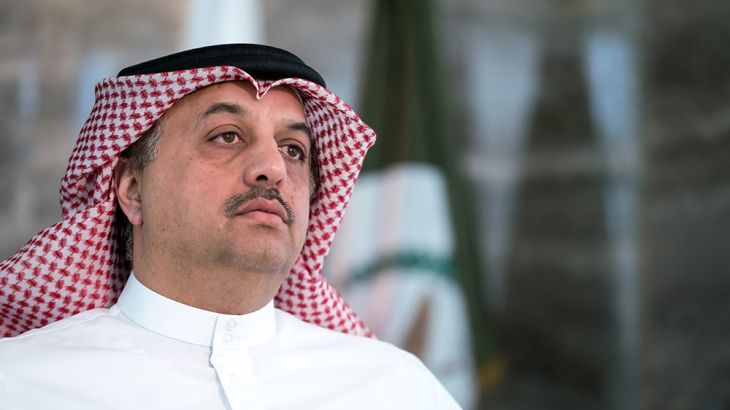
Gulf crisis: Is there a risk of a military escalation?
Khalid bin Mohammed al-Attiyah, Qatari defence minister, discusses Yemen war and potential solutions for the GCC crisis.
On May 23, Qatar woke up to news of a hack attributing false statements to the emir of Qatar.
The fake news was aired on several UAE and Saudi-owned networks in the Gulf. This prompted a series of diplomatic breakdowns between the GCC countries.
Keep reading
list of 4 itemsQatar emir condemns ‘genocide’ in Gaza, urges ceasefire at GCC summit
‘Enduring commitment’: Key takeaways from US-GCC joint statement
Analysis: Efforts to end Assad isolation gather speed after quake
Saudi Arabia, Bahrain, Egypt and the UAE cut diplomatic, commercial and transport links with Qatar on June 5, accusing Qatar of supporting “terrorism” – an allegation the country has repeatedly rejected as “baseless”.
On August 5, the Qatar-GCC crisis will enter its third month.
Earlier this week, the foreign ministers of the Saudi-led group met in the Bahraini capital of Manama.
”I
. All the parties are obliged to sit and discuss in an open dialogue, and to reach to a common understanding between the GCC countries.”]
They said they were ready for dialogue with Qatar if Doha agrees to certain demands and shows “its sincere willingness to stop funding terrorism and extremism”.
In an interview to Al Jazeera, Khalid bin Mohammed al-Attiyah, Qatar’s defence minister, says that if Gulf countries “stay in the stalemate situation, [the GCC] will be jeopardised”, adding that he believes “the wisdom of [Kuwaiti Emir Sabah Al-Ahmad Al Jaber Al Sabah] will not let it go this far”.
According to him, there are some signs of movement to resolve the crisis.
“Qatar, since day one, was calling for dialogue and I think today this language is prevailing in the GCC,” he says.
Regarding Qatar’s military exercises with the US and Turkey, he says: “Some of this training goes back to 2014 … this has nothing to do with what’s going on with the GCC. The United States is a strategic ally, especially on the defence and counterterrorism activity.
“The same with the Turks – we have a strategical relation with the Turks.”
Nevertheless, Qatar’s defence minister responded to the blockading countries assertion that they are ready for dialogue, if Qatar will accede to their 13 demands, by suggesting that there is room for negotiation, but not if sacrificing Qatar’s sovereignty is a prerequisite.
“Let’s talk about the 13 demands,” Khalid bin Mohammed tells Al Jazeera.
“Let’s see, the demand number 12… [it] says that if Qatar does not reply within 10 days, the demands are considered null and void, so they are already null and void, and even so Qatar was open to discuss any of the blockade concerns. Some of the 13 demands … are a basis on which we can discuss. But we cannot have a pre-acceptance, otherwise, we are giving away our sovereignty.”
Al Jazeera also asked Khalid bin Mohammed about Qatar’s role in the conflict in Yemen and whether Qatar was aware of the human rights violations of which the Saudi-led coalition has been accused. Khalid bin Mohammed noted that “Qatar was tasked to be inside Saudi Arabia, and we have been tasked to defend certain points, side by side with our colleagues from the Saudi military.”
“Qatar has not been involved at all inside Yemen, and this is the role which it had been a tasked with by the coalition operation command.”
Despite the continuing standoff, the Qatari defence minister believes that the rift in the GCC can still be mended. “I believe it’s fixable,” he said, “but it needs to start soon. We should put all our weight behind [Kuwaiti Emir] Sheikh Sabah [al-Ahmad Al Sabah] to bring this mediation to a success level.”
You can talk to Al Jazeera, too. Join our Twitter conversation as we talk to world leaders and alternative voices shaping our times. You can also share your views and keep up to date with our latest interviews on Facebook.